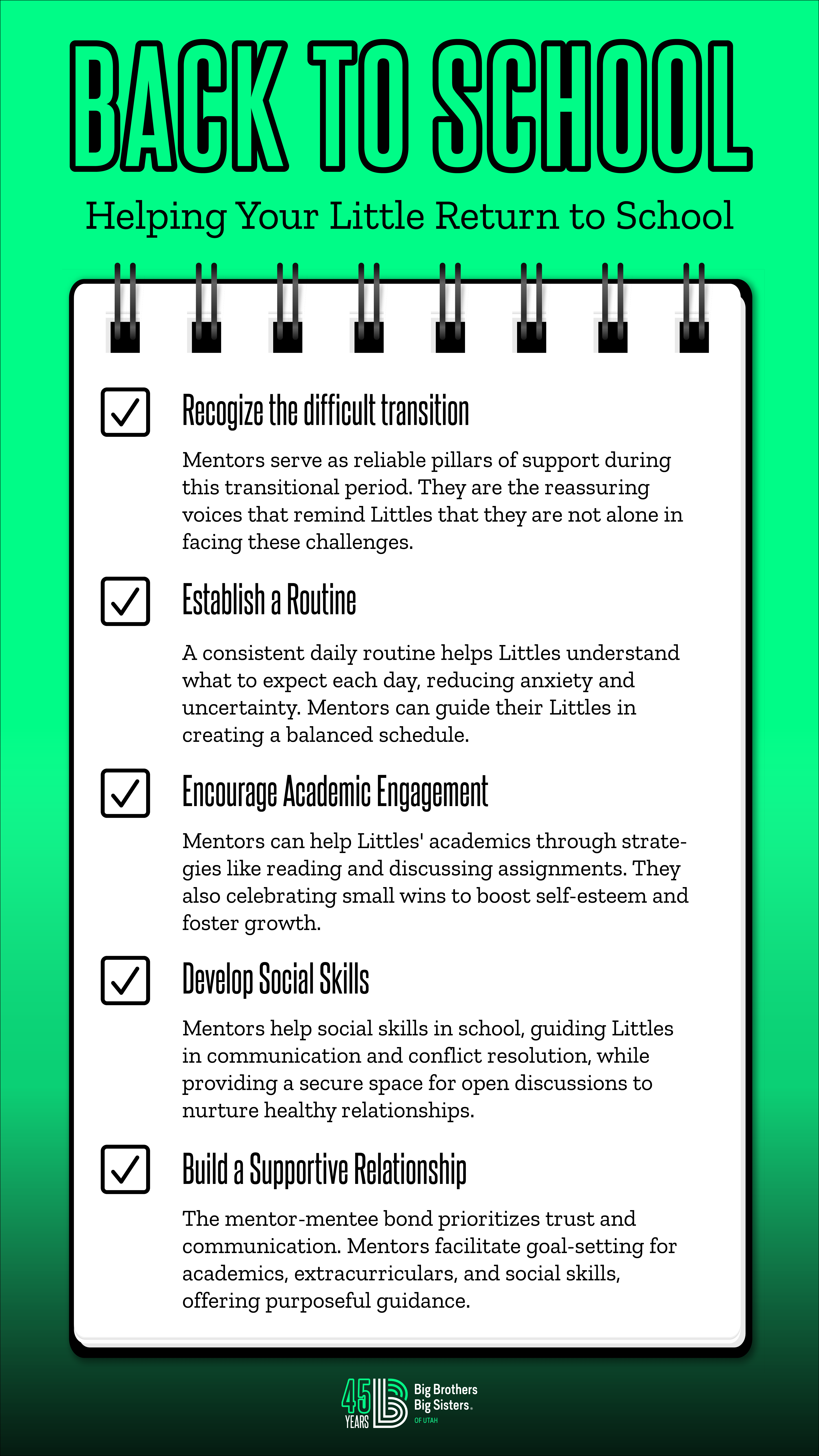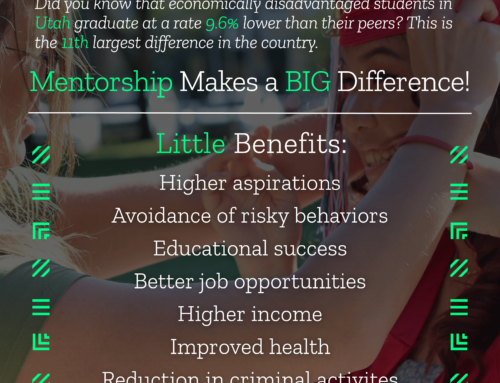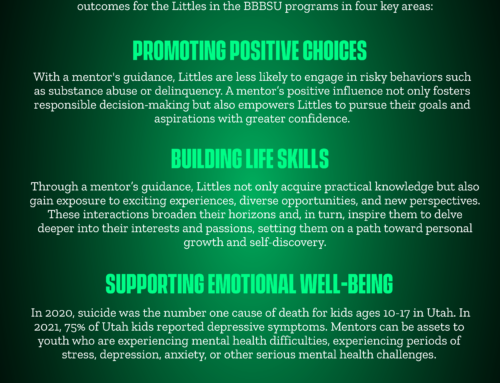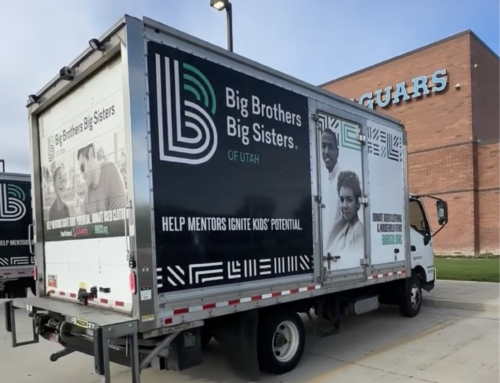As summer comes to a close and school rolls around the corner, many Littles are excited about the upcoming year, yet anxious about how to prepare for it. Therefore, Big Brothers Big Sisters of Utah understands that a smooth back-to-school transition is an important step that ensures your Little feels ready for what this new year will bring. As a Big, you can help your Little through this time by providing guidance and support in many ways. Going back to school can stir up feelings of anxiety, stress, excitement, and other feelings that can be difficult to go through on your own. Moreover, school can bring on more challenges than one might think. Many Littles struggle with social relationships, staying organized, feeling confident about their academics and the weight of parental expectations. A mentor’s support can help them through these problems and ease their transition overall. Mentors who participate in these sorts of volunteer opportunities in Utah, gain a sense of fulfillment from giving back, grow personally from the experience, and develop skills through their relationship with their Little. Big Brothers Big Sisters of Utah is here to help Mentors find strategies so that their Littles return to school with ease.
I. The Importance of a Smooth Back-to-School Transition
The back-to-school transition isn’t just about new backpacks and sharp pencils; it’s a critical phase that sets the tone for the entire academic year. Littles may wrestle with a range of emotions during this time, from excitement about reuniting with friends to apprehension about new teachers, classes, and routines. Add to this the pressure of academic expectations and social interactions, and it’s no wonder that children may feel overwhelmed.
This is where Big Brothers Big Sisters steps in. Mentors serve as reliable pillars of support during this transitional period. They are the reassuring voices that remind Littles that they are not alone in facing these challenges. By addressing potential anxiety, academic concerns, and social adjustments, mentors can play a pivotal role in easing the path for their Littles.
II. Building a Supportive Mentor-Mentee Relationship
A supportive mentor-mentee relationship can help to ease your mentee’s mind as they jump back into the swing of daily school life. Open communication is the key. A strong bond built on trust and understanding allows mentors to create an environment where Littles feel comfortable discussing their school-related concerns and aspirations. By openly sharing their own life experiences and challenges, mentors can show Littles that they are not alone in their journey and struggles.
Moreover, mentors can help set achievable goals for the school year. Big Brothers Big Sisters have offered their volunteer opportunities in Utah for many years and are experienced when it comes to helping Bigs and Littles set and reach their goals. Whether it’s improving grades, participating in extracurricular activities, or enhancing social skills, setting and working towards these goals together fosters a sense of purpose and direction for the Little.
III. Strategies for a Successful Back-to-School Transition
A. Establishing a Routine
Routine provides the much-needed stability in a child’s life. A consistent daily routine helps Littles understand what to expect each day, reducing anxiety and uncertainty. Mentors can guide their Littles in creating a balanced schedule that includes time for schoolwork, hobbies, physical activity, and relaxation. This structure not only contributes to better time management but also ensures that Little’s overall well-being is taken care of.
B. Encouraging Academic Engagement
Engaging with academics can be challenging, especially after a leisurely summer break. Mentors can support their Littles by offering simple yet effective strategies. Reading together, visiting local libraries, exploring educational websites, and discussing school assignments are excellent ways to stay involved in the learning process. By promoting a positive attitude toward learning, mentors contribute to their Littles’ academic success.
C. Developing Social Skills
School is not just about books; it’s also about building relationships. Social skills are invaluable assets that help Littles navigate the complexities of the school environment. Mentors can guide their Littles in understanding the importance of respectful communication, empathy, and active listening. They can also provide tips on making friends, managing conflicts, and being a positive presence in their peer group. By focusing on social skills, mentors empower their Littles to excel not only academically but also interpersonally. If you want to help a Little through these challenges, Big Brothers Big Sisters of Utah has countless volunteer opportunities in Utah where you can build this kind of relationship.
IV. Navigating Challenges Together
Struggles in school are inevitable, and setbacks are a natural part of the learning process. Mentors can play a crucial role in helping Littles cope with academic challenges. By sharing personal stories of overcoming obstacles and emphasizing the value of effort and growth, mentors can shift the focus from just being about getting good grades to the learning journey itself. This perspective shift fosters resilience and a willingness to persevere, essential qualities for success in school and beyond.
School environments can sometimes present social challenges like bullying or peer pressure. These situations can be daunting for Littles, but with the guidance of their mentors, they can navigate them with greater confidence. Mentors can create a safe space for open conversations, where Littles can express their feelings and concerns without fear of judgment. By providing emotional support, mentors empower Littles to stand up for themselves, make informed decisions, and develop healthy relationships.
V. Celebrating Achievements and Progress
Every milestone achieved, no matter how small, is worth celebrating. Mentors can amplify their Littles’ sense of accomplishment by acknowledging their efforts and progress. This positive reinforcement boosts self-esteem, motivation, and a sense of pride in their achievements. Whether it’s acing a test, participating in a school event, or simply demonstrating improved study habits, mentors have the opportunity to foster a growth mindset that encourages Littles to continuously strive for excellence.
IV. Volunteerism and Giving Back
One unique aspect of the Big Brothers Big Sisters program is the emphasis on volunteerism and community involvement. Volunteering not only enriches the lives of Littles but also provides Mentors with valuable life lessons. In Utah, there are many volunteer opportunities available through Big Brothers Big Sisters that allow mentors and Littles to engage with the local community. From participating in educational workshops to volunteering at local events, these experiences instill a sense of responsibility and civic pride in Bigs.
By exploring these volunteer opportunities, mentors and Littles create lasting memories while making a positive impact on the community they belong to. This hands-on approach to giving back encourages Littles to become well-rounded individuals with a sense of purpose beyond the classroom.
Conclusion
The back-to-school season is a critical time for Littles, and mentors from Big Brothers Big Sisters have a unique opportunity to make this transition smoother and more impactful. By focusing on open communication, routine, academic engagement, and social skills, mentors can create an environment where Littles thrive both academically and personally. The availability of volunteer opportunities in Utah through Big Brothers Big Sisters further enriches this experience, offering a chance for mentors to give back while learning valuable life lessons. As we embrace the challenges and victories of a new school year, the role mentors play in shaping bright futures is invaluable.







